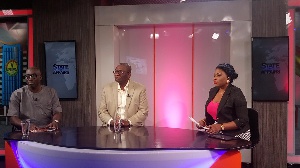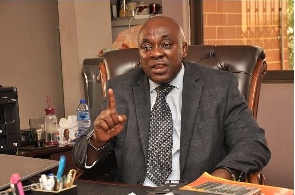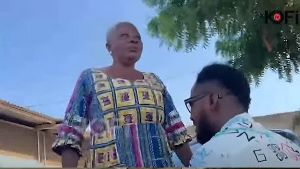 Abraham Amaliba (l),Emmanuel Kyeremateng Agyarko (m) and Kemini Amanor
Abraham Amaliba (l),Emmanuel Kyeremateng Agyarko (m) and Kemini Amanor
A member of the National Democratic Congress’ (NDC) legal team Abraham Amaliba has described the conduct of the Chairman of the Ad-hoc Committee of Parliament charged to investigate Hon. Boakye Agyarko's bribery scandal as questionable.
Speaking on the first anniversary edition of 'State of Affairs’ on GhOne TV, the lawyer explained that inviting the Chairman of the Appointments Committee for questioning without giving hearing to the case of the petitioners first is in error.
"Even in normal court procedure the petitioners are always given first hearing before those implicated. Today's sitting to me is irregular," Lawyer Amaliba noted.
He also cited the exclusion of two petitioners Hon. Okudzeto Ablakwa and Alhassan Suhuyini from the investigation process as suspicious and diabolic.
Lawyer Amaliba was however excited that the aforementioned petitioners have decided to write to the Chairman of the Ad-hoc Committee, Hon. Joe Ghartey to allow them opportunity to be a part of the ongoing investigations.
On his part, the decision of the Ad-hoc committee to give hearing to only four persons in the entire probe is inaccurate and already give some level of pre-emption of how the outcome of the investigations will pan out.
The vociferous lawyer has also expressed disappointment at the absence of cross examination in the ongoing probe and advised the Adhoc Committee Chairman to follow due process.
Although he acknowledged that the parliamentary probe is a useful exercise, he also stated that the outcome of the Committee's investigation will determine its credibility or otherwise.
Lawyer Amaliba also called on the public not to undermine the ongoing investigations but to see it as a step for Parliament to purge itself of speculations that it is corrupt.
The New Patriotic Party's Member of Parliament for Ayawaso Wuogon and a brother of Boakye Agyarko emphasized that his brother didn't bribe anyone on the Appointment Committee.
He lauded his brother's performance at the vetting as extremely good and question why his brother will pay bribe to seal his approval in Parliament.
"This is not a person who performed abysmally at the vetting. I believe even if the pass mark was 50%, he exceeded the threshold. So why would he pay a bribe? The margin of seats between the minority and majority is very substantial. So even if the minority decides not to vote for his approval, he would have still pulled through. I don't understand the logic that he paid bribe," Hon. Emmanuel K. Agyarko said.
Mr. Kyeremanteng Agyarko indicated that the investigation committee has done no wrong in its first hearing adding that the Chairman of the Committee has given people who want to appear before the Committee to state or deny a claim to do so and recommended that the two Hon.
MPs purported to have been excluded from the hearing to seize the opportunity.
He said the Privileges Committee of Parliament should have spearheaded the investigation but because it is chaired by the chairman of the Appointment Committee, Hon. Joseph Osei Owusu, he had to recuse himself because he stands accused in the bribery scandal as well.
This according to him underscores the speaker of Parliament's decision to form an ad-hoc committee to steer the fact findings.
On his part, public perception that parliament is corrupt is too sweeping because not all parliamentarians are unethical.
"The Executive, the Judiciary, Legislature, the media and the police have all been described as corrupt but it doesn't mean the institutions in its entirety are corrupt. I have been in Parliament for a long time, l have not given, receive or solicited for any bribe. So it is not true that all of us parliamentarians are corrupt,” Hon. Agyarko remarked.
Both described the ongoing investigations into Hon. Boakye Agyarko’s bribery allegations as very useful and one that could correct wrong perceptions about parliament depending on the outcome.












